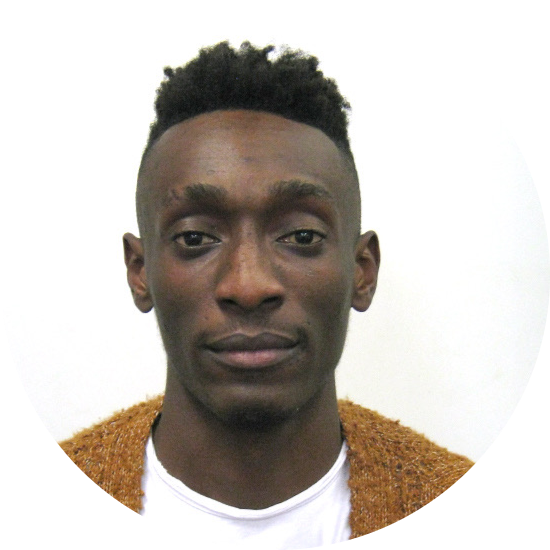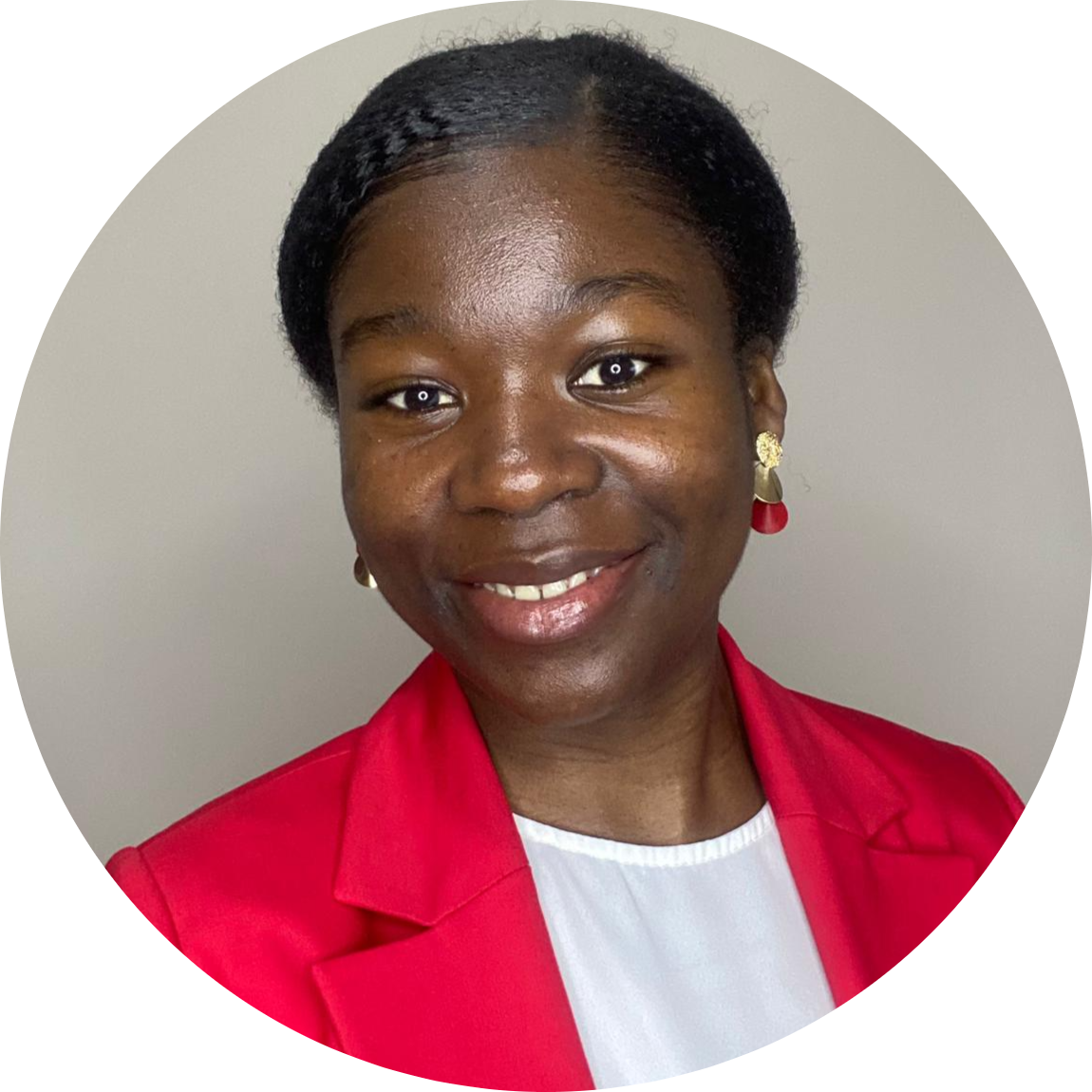Let’s call it out. You’re able to understand when people speak and unable to speak just because you’ve been either:
-
learning French in a passive way aka you’re prioritizing input (consuming French content and knowledge) over output (speaking and practicing every time you get a chance).
-
using the wrong French learning method, aka you’re repeating pre-recorded audios without context, internalizing sentences (from apps like Duolingo) that don’t make sense.
-
working with a French tutor who lectures you instead of creating a practice environment for you.
But, worry not. In this piece, we’ll explore the mistakes you’re making with how you learn French and how you can address them.
🇫🇷 Learn From Meghan's Mistakes!
Meghan spent months trying out techniques like vocabulary memorization, spaced repetition, and gamification apps like Duolingo. None of it worked, instead it ended up being total waste of time and money. She had a breakthrough only after discovering Get French Classes where she went through our active immersion, that helped her:
-
build the daily habits of speaking French,
-
practice under real-life scenarios through private French classes,
-
improve fluency through group classes with other French learners.
Join one of our French courses and start speaking French today.
3 mistakes you’re making with how you learn French that make that you understand when people speak French but can’t speak yourself
You’re prioritizing passive language skills over active ones
When prospective French learners come to us concerned that they can understand when people speak but can’t communicate, the immediate implication is that they’re passive learners.
Passive French learning is when you engage in activities like reading French books, articles, or subtitles or listening to French podcasts, radio shows, or movies.
These skills allow you to consume and comprehend French content without the pressure of having to produce the language yourself. It's like being a spectator at a football game—you can watch, understand, and enjoy the game without having to step onto the field and play.
However, relying too heavily on passive skills leads to a strong comprehension foundation but a weak speaking ability. Imagine you're an avid football fan who has watched countless games and knows all the rules and strategies.
But when you're thrown into a game and asked to play, you struggle to perform because you haven't practiced actively participating.
This is where active language skills come into play. When you speak or write in French, you're engaging your active skills. You're no longer just a spectator; you're a participant, generating the language yourself.
This can be more challenging and intimidating because you have to recall vocabulary, construct sentences, and express your thoughts coherently in real time.
Consider this: You've been studying French for a while, and you can easily read and understand French news articles online.
However, when you meet a French-speaking friend for coffee and try to discuss the news you've read, you find yourself struggling to express your thoughts fluently. This is because your passive skills (reading comprehension) are strong, but your active skills (speaking) haven't been practiced enough.
To bridge this gap, you should balance your passive and active skill development. So, while reading and listening are crucial for building a strong comprehension foundation, it's equally important to dedicate time and effort to speaking and writing practice.
This can include activities like conversing with native speakers, participating in language exchanges, joining French conversation groups, or even talking to yourself in your mirror.
You’re using the wrong French learning methods
Picture this: You're sitting in a French classroom, diligently taking notes on verb conjugations and memorizing lists of vocabulary words. You excel in written assignments and ace every grammar quiz.
However, when it comes to speaking French in real-life situations, you find yourself at a loss for words, struggling to form sentences quickly and naturally.
This scenario is not uncommon. Many language learners find themselves in a similar situation, where they have a solid grasp of grammar and know a lot of words but struggle to apply that knowledge in conversation.
The reason? Traditional language learning methods often prioritize passive skills over active ones.
Here are some learning methods that don’t necessarily lead to French-speaking fluency.
-
You spend a significant amount of time using gamified apps. How? Well, these apps only focus on helping you analyze sentence structures, complete fill-in-the-blank exercises, and memorize vocabulary. While these activities can help you understand the mechanics of the French language, they don't necessarily translate to real-world speaking skills. Simply because with these apps, you do not have enough opportunities to engage in authentic, spontaneous French conversations, where you need to think on your feet, respond to unexpected questions, and express yourself naturally.
-
You focus on passing exams or getting badges. By doing so, you inadvertently neglect the development of practical speaking skills.
It's easy to fall into the trap of studying solely for the sake of acing tests rather than learning French for real-life communication.
-
You work with a French tutor who focuses on lecturing you rather than fostering an environment where you can practice. French tutors who lecture their learners cause information overload.
You know a lot of things, and when you hear people speak, you have a sense of “deja vu,” but you can’t utter the basic French sentence to respond.
To overcome these limitations, it's essential to seek out language learning methods and resources that prioritize speaking practice. This might involve:
-
Engaging in conversation with native French speakers or language partners.
-
Participating in immersive language programs or workshops that emphasize real-life communication.
-
Using language learning apps or websites that offer interactive speaking exercises and simulated conversations.
-
Attending French meetups, language cafes, or discussion groups to practice speaking in a relaxed, authentic setting.
You’re struggling with psychological barriers to speaking (e.g., perfectionism, fear of judgment)
Psychological barriers hinder your progress, despite having a strong comprehension of the language. Perfectionism is when learners feel the need to speak flawlessly, fearing mistakes.
This way of thinking can make people avoid chances to speak and slow down their progress. But making mistakes is a normal part of learning a language. Seeing them as opportunities to learn is very important for improving.
Fear of judgment from native speakers or more proficient learners is another common barrier.
You worry about your accent, pronunciation, or limited vocabulary, leading to anxiety and avoidance of French conversations. In reality, most native speakers appreciate your efforts and understand the challenges of language learning.
Self-consciousness can also hold you back, causing you to compare yourself unfavorably to more advanced speakers. Focusing on the content of the message rather than perfect delivery can help overcome this barrier.
🇫🇷 Learn From Meghan's Mistakes!
Meghan spent months trying out techniques like vocabulary memorization, spaced repetition, and gamification apps like Duolingo. None of it worked, instead it ended up being total waste of time and money. She had a breakthrough only after discovering Get French Classes where she went through our active immersion, that helped her:
-
build the daily habits of speaking French,
-
practice under real-life scenarios through private French classes,
-
improve fluency through group classes with other French learners.
Join one of our French courses and start speaking French today.
How to rewire your brain to solve the “I can understand but can’t speak” problem
Shift from translation to direct association
One of the key factors contributing to the " I can understand but can't speak " problem is the tendency to rely on mental translation.
When you hear French, your brain automatically translates it into your native language, allowing you to understand the meaning.
However, when it comes to speaking, you find yourself trying to translate your thoughts back into French, leading to hesitation and difficulty in expressing yourself fluently.
To rewire your brain for more effective French communication, you need to shift from translation to direct association.
This means training your mind to associate French words, phrases, and concepts directly with their meanings, rather than relying on your native language as an intermediary.
To start thinking in French, immerse yourself in the language as much as possible.
-
Surround yourself with French media, such as movies, podcasts, and books, to expose your brain to all sorts of vocabulary and sentence structures.
-
As you encounter new words and phrases, try to understand their meaning through context and visual cues rather than immediately seeking a translation.
-
Engage in daily French monologue exercises, where you narrate your thoughts, actions, and surroundings in French, even if you're alone. This practice helps you build the habit of thinking in French and strengthens the direct connections between concepts and their French expressions.
-
Another effective technique is to describe images or scenes in French, focusing on what you observe without relying on your native language. The exercise forces your brain to retrieve French vocabulary and construct sentences directly, bypassing the translation process.
To minimize mental translation, train yourself to resist the urge to translate every word or phrase you encounter.
Instead, try to grasp the overall meaning and context. Trust your instincts and allow yourself to understand French directly, even if you don't catch every single word.
Embrace the concept of "good enough" comprehension. You don't need to understand 100% of the words to follow a conversation or express yourself effectively.
Focus on key phrases, context, and nonverbal cues to fill in the gaps. When speaking, avoid the temptation to mentally translate your thoughts from your native language to French.
Instead, formulate your ideas directly in French, even if your sentences are simpler or less eloquent at first.
Master functional language chunks
Functional language chunks are high-frequency phrases and expressions that native speakers use in everyday conversations.
By learning and incorporating these chunks into your speaking practice, you can quickly improve your fluency and communicate more naturally in French.
Here’s how.
1 - Identify and learn high-frequency phrases
Start by identifying the most common phrases and expressions used in French conversations.
These may include greetings, introductions, asking for directions, making requests, expressing opinions, and more. Pay attention to how native speakers use these phrases in context, and make note of their exact wording and pronunciation.
Resources such as phrasebooks, language learning websites, and authentic French media can be invaluable in discovering these high-frequency phrases. Create a list or flashcards of the most essential chunks and prioritize learning them.
When studying these phrases, focus on understanding their meaning and the contexts in which they are used. Internalize them as complete units rather than individual words.
2 - Incorporate chunks into your speaking practice
Start by using these phrases in controlled environments, such as conversation practice with a tutor. Deliberately integrate the chunks into your responses and interactions, even if it feels slightly unnatural at first.
As you become more comfortable with the phrases, challenge yourself to use them in a variety of contexts and situations.
Role-play different scenarios where these chunks would be appropriate, such as ordering food at a restaurant, asking for recommendations, or expressing agreement or disagreement in a discussion.
Gradually increase the complexity of your speaking practice by combining different chunks and expanding upon them with your own ideas and opinions.
It’s a progressive approach and it’ll help you build confidence in using the phrases. It’ll also allow you to adapt them to your unique communication needs.
Develop a French persona
By adopting a French-speaking alter ego, you can liberate yourself from the limitations and fears associated with your native language identity.
The benefits of adopting a French-speaking alter ego
When you create a French persona, you give yourself permission to step outside your comfort zone and embrace a new linguistic identity.
This alter ego can be a more confident, outgoing, and expressive version of yourself. By embodying this persona, you can temporarily overcome the self-doubt and inhibitions that often come with speaking a foreign language.
Creating a French persona for yourself can also help you get over the fear of making mistakes or not sounding perfect. Your French alter ego is separate from your native language self. This lets you take more risks and experiment with the language more freely.
Moreover, developing a French persona can enhance your cultural immersion and understanding. By embodying the characteristics and mannerisms of a French speaker, you gain a deeper appreciation for the language's nuances, expressions, and social norms.
Techniques for embodying your French persona
To embody your French persona, start by creating a detailed character sketch. Give your alter ego a name, a background story, and specific personality traits that align with your desired French-speaking self. Visualize how this persona would speak, act, and interact in various situations.
When practicing French, consciously step into the role of your French persona. Adopt the posture, gestures, and facial expressions that reflect the confidence and expressiveness of this alter ego. Speak with the intonation, rhythm, and enthusiasm that your persona would employ.
Engage in role-playing exercises where you act out different scenarios as your French persona. Imagine how your alter ego would navigate conversations, handle challenges, and express ideas. The more you practice embodying this persona, the more natural and authentic it will become.
Seek out opportunities to interact with French speakers while in character. Attend French conversation groups, language exchanges, or cultural events as your French persona. Immerse yourself in the language and culture, allowing your alter ego to take the lead in conversations and interactions.
Remember that developing a French persona is a gradual process. It may feel awkward or unnatural at first, but with consistent practice and commitment, embodying your alter ego will become more instinctive.
4 French speaking practice techniques to fast-track your fluency
Shadowing native speakers to improve fluency
Shadowing is a powerful technique that involves listening to native French speakers and simultaneously repeating what they say, attempting to match their pronunciation, intonation, and rhythm.
It helps you develop a more natural and authentic French speaking style, as you actively engage with the language and train your brain to process and produce French sounds more efficiently.
To begin shadowing, select French audio content that is slightly above your current level, such as podcasts, audiobooks, or videos with clear and articulate speakers.
Start by listening to a short segment of the audio, focusing on the speaker's pronunciation, pace, and expression. Make sure it’s somewhere between 2-3 minutes long. Then, replay the segment and try to repeat what you hear, mimicking the speaker's voice as closely as possible.
As you become more comfortable with shadowing, challenge yourself to repeat the audio with minimal delay, almost overlapping with the speaker. This real-time repetition helps you develop quick language processing skills and improves your fluency.
Gradually increase the length and complexity (in terms of the speaker’s accent, pace, etc.) of the audio segments you shadow, and vary the content to expose yourself to different accents, vocabularies, and speaking styles.
Retelling stories and experiences in French
Retelling stories and experiences in French is an effective way to practice your speaking skills and consolidate your language knowledge.
This technique involves recounting events, whether they are personal anecdotes, news articles, or fictional tales, entirely in French.
To begin, choose a story or experience that you are familiar with and feel comfortable discussing. Start by breaking down the narrative into key points and organizing your thoughts.
Then, practice retelling the story in French. Ensure you use descriptive language and appropriate verb tenses, and connect your ideas coherently.
As you retell the story, challenge yourself to incorporate new vocabulary, idiomatic expressions, and complex sentence structures.
Don't worry if you struggle to find the perfect words or make mistakes; the goal is to communicate your message and develop your speaking fluency. With practice, you'll find yourself expressing your thoughts more easily and naturally in French.
Practicing self-talk
Self-talk involves narrating your daily actions, thoughts, and observations in French.
The technique helps you integrate the language into your everyday life, making French a constant presence in your mind and improving your ability to think and express yourself in the language.
Start by setting aside dedicated time each day to practice self-talk in French. During this time, narrate your actions as you perform them, describing what you are doing, seeing, and feeling.
For example, as you make your morning coffee, you might say, " Je verse de l'eau dans la cafetière. Je mets du café moulu dans le filtre. J'attends que le café soit prêt. "
As you become more comfortable with self-talk, expand your narration to include your thoughts, opinions, and reflections.
Express your reactions to events, articulate your goals and plans, and explore your emotions in French. This practice helps you develop your inner French voice and strengthens your ability to communicate your ideas fluently.
Engaging in simulated conversations and role-plays
Simulated conversations and role-plays provide valuable opportunities to practice your French speaking skills in realistic and engaging contexts.
By immersing yourself in hypothetical scenarios and dialogues, you can develop your ability to express yourself spontaneously and navigate common communication challenges.
To get started, identify everyday situations where you might need to use French, such as ordering at a restaurant, asking for directions, or discussing your hobbies with a friend. Create a script or outline for the conversation, including key phrases, questions, and responses you might need.
Then, practice the conversation with a language partner, tutor, or even by yourself, taking on different roles and experimenting with various responses. Focus on using authentic French expressions, appropriate body language, and natural intonation.
As you become more comfortable, gradually increase the complexity and spontaneity of the conversations, allowing for more improvisation and genuine interaction.
Working with a French tutor or a native speaker
When working with a private French tutor, you benefit from their expertise in the French language and their ability to tailor lessons to your specific needs and goals.
A skilled tutor can identify your strengths and weaknesses, provide targeted feedback on your pronunciation, grammar, and vocabulary usage, and create a supportive environment that encourages you to speak French with confidence.
To find a suitable French tutor, consider reaching out to language schools, universities, or online tutoring platforms. Look for tutors who have experience teaching French as a foreign language and who can adapt their teaching style to your learning preferences.
Schedule regular sessions with your tutor, and come prepared with specific questions, topics, or areas you'd like to focus on during each lesson.
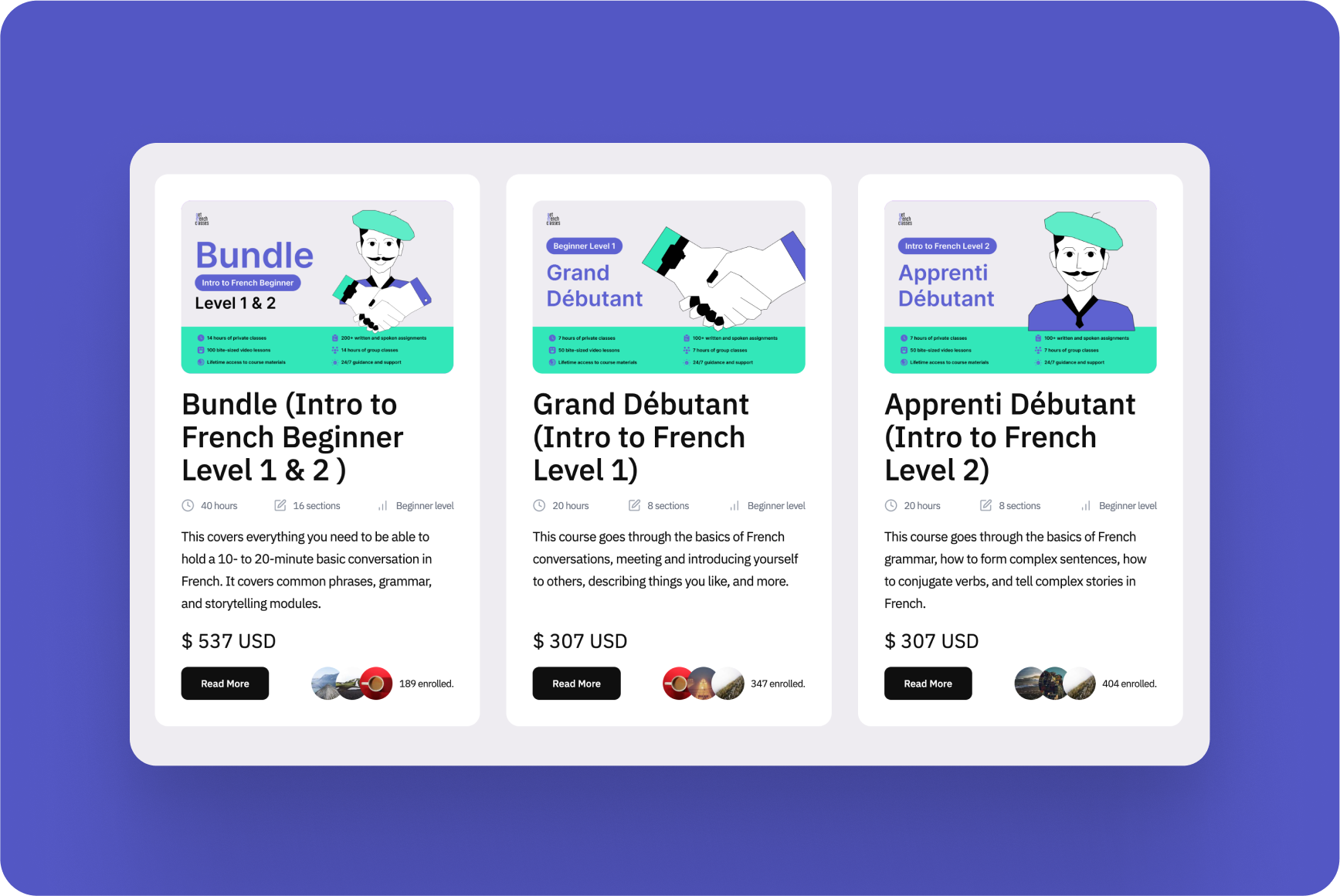
In addition to working with a tutor, finding a native French speaker to be your practice buddy can be incredibly beneficial. A practice buddy is someone with whom you can regularly engage in French conversations, exchange language knowledge, and build a friendly rapport.
This informal language exchange allows you to practice speaking French in a more relaxed and authentic setting.
To find a French practice buddy, you can attend French language meetups, join online language exchange communities, or connect with French speakers through social media platforms.
When reaching out to potential practice buddies, be clear about your language goals and the level of commitment you're seeking. Establish a regular schedule for your conversations and agree on a format that works for both of you, whether it's in-person meetings, video calls, or text-based chats.
During your practice sessions with your buddy, don't be afraid to make mistakes or ask for clarification when needed; a supportive practice buddy will be patient and understanding.
How Get French Classes helps you become a fluent and self-confident French speaker
You get to work with a certified private French tutors
When you book a class with us, we pair you with certified private French tutors who are dedicated to helping you achieve your language goals.
Our tutors are more than just teachers; they are your French-speaking companions who provide a safe and supportive learning environment. During your one-on-one sessions, you can make mistakes without fear of judgment, ask questions freely, and practice your French skills extensively.
These private lessons go beyond the pre-recorded video content, diving deeper into the nuances and complexities of the French language.
Your tutor will help you clarify any misunderstandings from previous lessons, provide feedback on your assignments, and guide you through more advanced concepts and real-life applications.
But our tutors' expertise extends far beyond grammar and vocabulary. They are trained to adapt to your unique learning style, goals, and pace.
Whether you're learning French for personal or professional reasons, your tutor will tailor the sessions to your specific needs, ensuring that you receive the most relevant and effective instruction.
You are matched with French-speaking buddies from across the world
Our programs include group classes that connect you with French-learning buddies from around the globe.
Once a week, you'll join five other learners and your private French tutor in dynamic group sessions designed to boost your conversational skills and cultural understanding.
During each group class, you'll be paired with two other learners to form a team. Together, you'll engage in lively debates, discussions, and activities centered around a specific theme or topic.
As you express your opinions and share your experiences in French, your peers will actively listen and take note of any mistakes or areas for improvement in your speaking. In turn, you'll do the same for them, creating a mutually beneficial learning experience.

As a busy mom and professional, learning French has been complicated for me. But since I started learning with Get French Classes, I have seen my French improve FAST. Through the lessons, I not only get to practice every day, but I also have more opportunities than before. I can practice with my advisor, private tutor, and other learners like me.

I chose Get French Classes because their teaching materials and content are incredibly rich, going from everyday expressions to more specialized ones. I also get many opportunities to interact with tutors, and that has a huge impact on my fluency.

What I like the most about the program is that all my tutors are native speakers. They do help me not only understand the French language, but also the culture and the nuances of some words and expressions. And mostly, the live sessions are engaging and fun.
I've tried learning French on my own before, but nothing compares to this program. The combination of video lessons, live tutoring sessions, and group practice made learning French enjoyable and effective.
These group classes are not only effective for honing your French conversational abilities but also for exposing you to a diverse range of accents, perspectives, and cultural insights.
By interacting with French learners from different backgrounds and nationalities, you'll develop a more well-rounded understanding of the language and its global context.
Moreover, the relationships you forge through these group classes can extend beyond the virtual classroom.
Many of our learners continue to practice their French with their buddies outside of class, forming study groups, language exchange partnerships, and even lasting friendships.
You get to practice every day through assignments
Our programs also include daily assignments that help you reinforce your learning, apply new concepts, and track your progress.
Our assignments come in various formats, including written exercises, spoken tasks, and interactive activities. Each assignment is carefully crafted to align with the lessons you've completed, allowing you to practice the specific skills and concepts you've learned.
Written assignments may include grammar exercises, vocabulary quizzes, and short composition tasks. These assignments help you develop your French writing skills, improve accuracy, and expand your linguistic range.
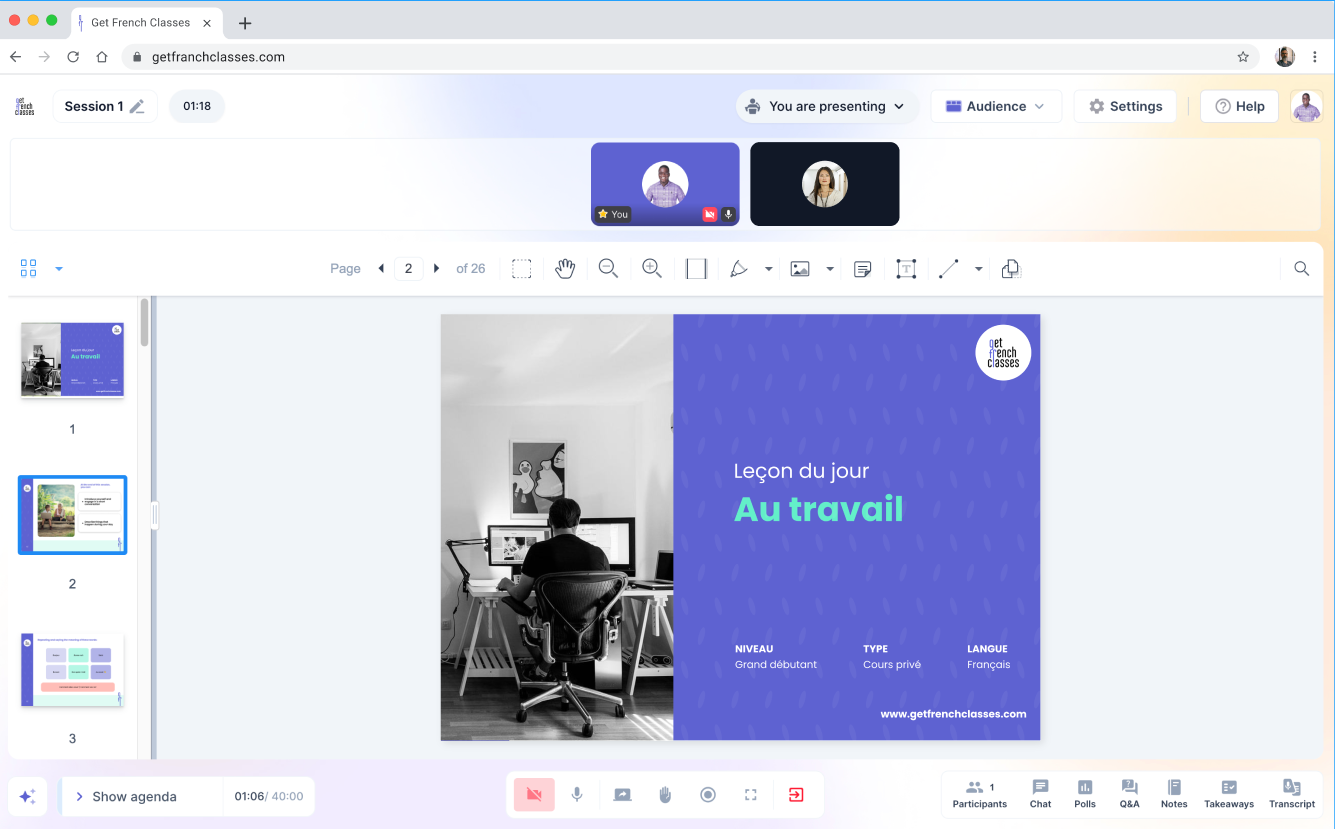
By regularly engaging in written practice, you'll gain confidence in constructing sentences, expressing your thoughts, and communicating effectively in French.
Spoken assignments are equally important for building your French conversational skills. These tasks may involve recording yourself speaking on a given topic, describing an image, or engaging in a simulated dialogue.
By practicing your pronunciation, intonation, and fluency through these assignments, you'll become more comfortable and confident in speaking French.
Our assignments also incorporate interactive elements, such as gamified vocabulary exercises and multimedia-based activities. These engaging tasks make learning French more enjoyable and help you retain information more effectively.
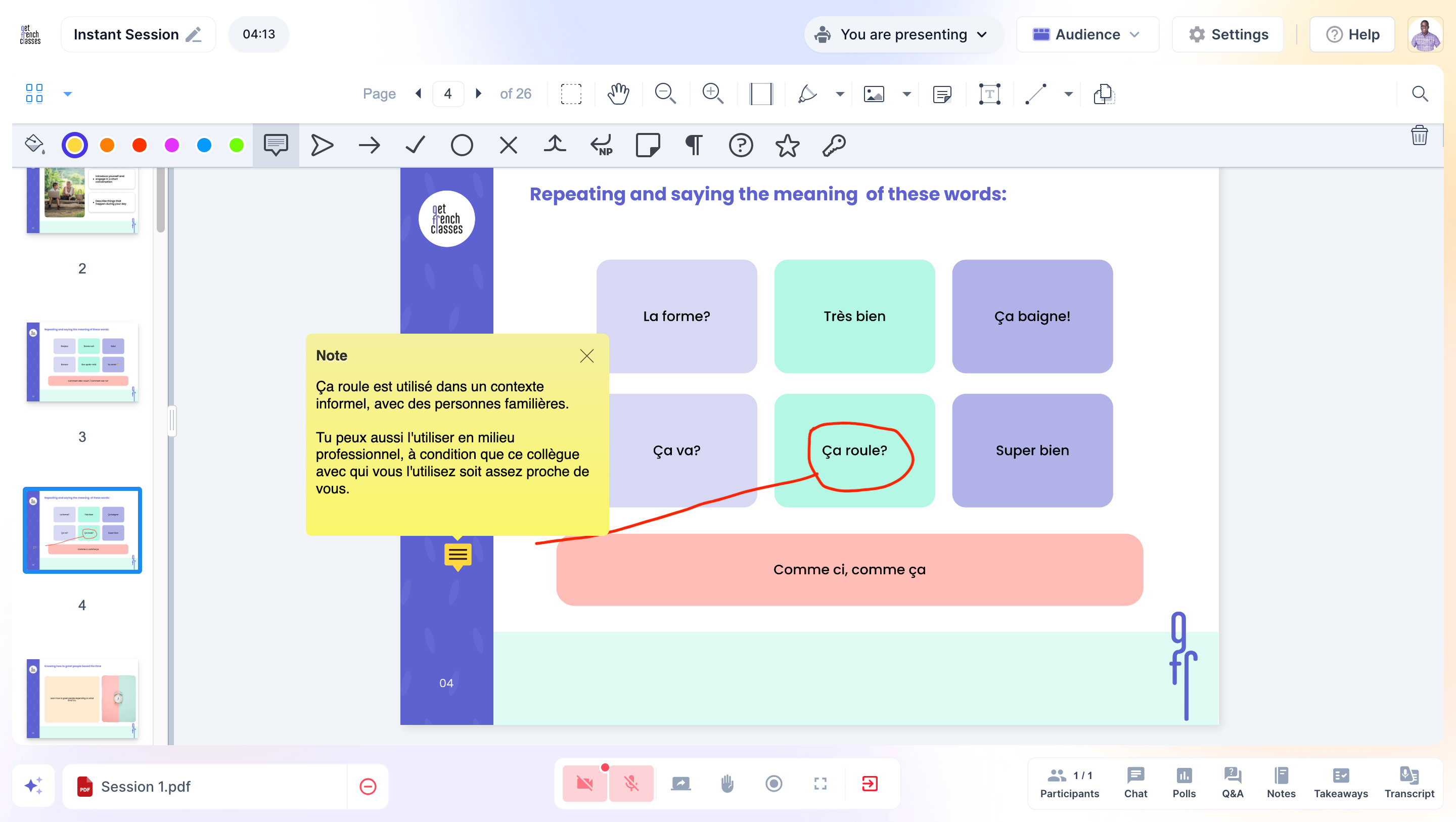
Completing your daily assignments is not only essential for your personal progress but also for unlocking your private tutoring sessions.
By submitting your assignments regularly, you demonstrate your commitment to learning and provide your tutor with valuable insights into your strengths and areas for improvement.
This enables your tutor to tailor their guidance and feedback to your specific needs, ensuring that you receive the most targeted and effective support.
You have access to tons of French learning resources and materials
At Get French Classes, we also provide our students with access to a wealth of French learning resources and materials, ensuring that you have everything you need to succeed in your language journey.
Our resource library includes a wide range of materials designed to cater to different learning styles, interests, and proficiency levels. Whether you're a visual learner, an auditory learner, or someone who thrives on interactive content, you'll find resources that suit your needs.
-
Video Lessons : Our video lessons are the cornerstone of our program. These engaging and informative videos break down complex French concepts into digestible chunks, making it easier for you to grasp and retain new information. Each video is carefully crafted by our experienced instructors and features real-life examples, clear explanations, and practical tips for mastering the French language.
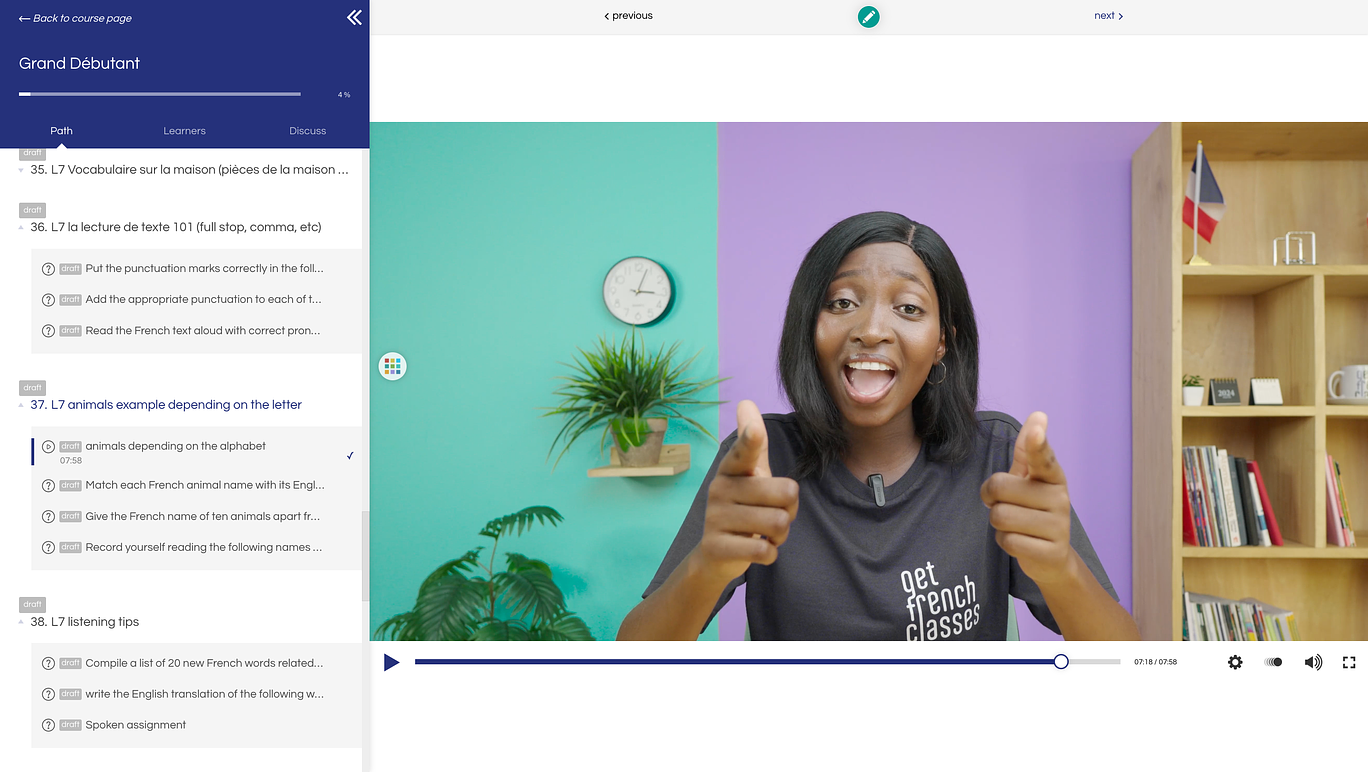
-
Audio Materials : We offer a vast collection of audio materials, including dialogues, and pronunciation exercises. These resources are perfect for improving your listening comprehension skills and familiarizing yourself with different French accents and speaking styles. You can access these audio materials anytime, anywhere, making it convenient to practice your French on the go.
-
Reading Texts : Our library includes a diverse selection of French reading texts, ranging from beginner-friendly stories to more advanced articles and literature excerpts.
-
Interactive Exercises : We believe that language learning should be engaging and fun. That's why we offer a variety of interactive exercises, such as quizzes, games, and multimedia activities.
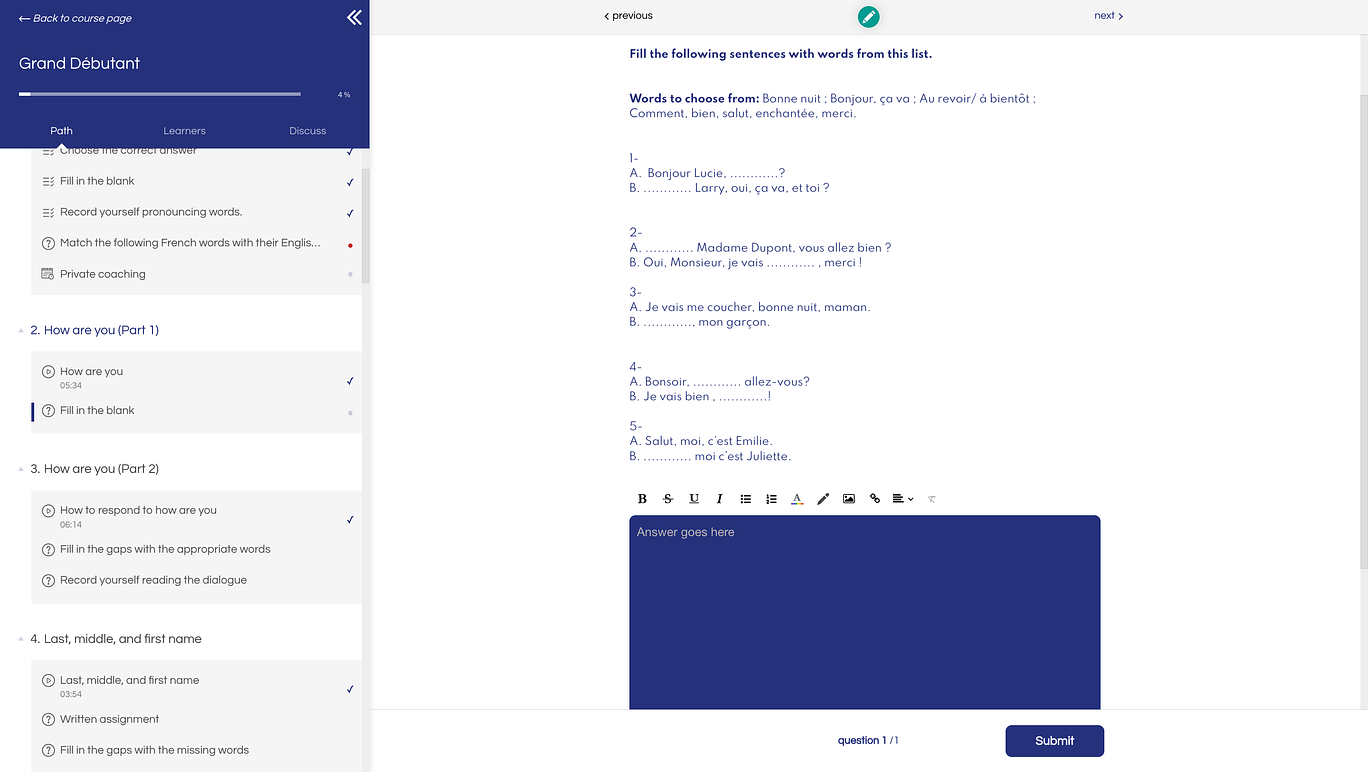
-
Downloadable Resources : In addition to online materials, we provide downloadable resources such as worksheets, study guides, and reference materials. These resources are perfect for offline learning.
Go from “I can understand but can’t speak” to speaking French like a native
You know by now that learning a new language like French is a challenging journey, and it's not uncommon for learners to find themselves in a situation where they understand the language when spoken but struggle to express themselves fluently.
You also know the importance of shifting from passive to active learning. Learning more through functional language chunks, and developing a French-speaking persona to overcome psychological barriers.
As you implement these strategies and incorporate effective speaking practice techniques like shadowing, retelling stories, self-talk, simulated conversations, and working with a tutor or native speaker, you can fast-track your progress toward French fluency.
At Get French Classes, we understand the challenges learners face and have designed our programs to address these issues head-on.
Our approach combines personalized tutoring, group practice, and comprehensive resources to provide you with a well-rounded and effective learning experience.
When you join our program, you'll be paired with a certified private French tutor who will guide you through one-on-one sessions tailored to your specific needs and goals. You’ll discuss the nuances of the language, get feedback, and practice your skills in a supportive environment.
Moreover, our weekly group classes connect you with French-learning buddies from around the world. You’ll have the opportunity to hone your conversational skills and learn from your peers as you take part in fun debates, discussions, and activities.
To reinforce your learning and track your progress, we provide daily assignments in various formats (written exercises, spoken tasks, and interactive activities). With these assignments, you'll develop your writing and speaking skills, apply new concepts, and more.
Furthermore, as a learner at Get French Classes, you'll have access to a wealth of French learning resources and materials, including video lessons, audio materials, reading texts, interactive exercises, and downloadable resources.
These materials cater to different learning styles and proficiency levels. You can be sure you’ll have everything you need to succeed in your French learning journey.
Overcoming the "I can understand but can't speak" problem in French learning requires a multi-faceted approach that addresses common mistakes, rewires your brain, and provides ample opportunities for speaking practice — and we are the best option if that’s what you need.
We’ll help you break through the barriers holding you back and achieve your goal of becoming a fluent and self-confident French speaker. Sign up with us today.
🇫🇷 Learn From Meghan's Mistakes!
Meghan spent months trying out techniques like vocabulary memorization, spaced repetition, and gamification apps like Duolingo. None of it worked, instead it ended up being total waste of time and money. She had a breakthrough only after discovering Get French Classes where she went through our active immersion, that helped her:
-
build the daily habits of speaking French,
-
practice under real-life scenarios through private French classes,
-
improve fluency through group classes with other French learners.
Join one of our French courses and start speaking French today.



